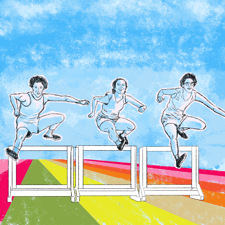A Field Guide to Philosophy of Sport
A discipline that darts past the zero-sum game.
By Pam R. Sailors
Illustration by Janelle Delia (used with permission).
Picture the typical interaction at a general philosophy conference — and you will not be imagining what happens when philosophers of sport gather.
In traditional philosophy, the adversarial model of engagement often dominates. At the big annual conference, you give a paper and then, during the Q&A period, a colleague stands up determined to tell you in as many words as possible, in front of as many people as possible, citing themselves as much as possible, why you’re wrong. (Invariably these remarks will end, “I guess that was really more of a comment than a question.”)
Disagreements definitely happen among us philosophers of sport. We sometimes disagree, for example, about the essential elements of sport — whether solo hiking and e-sports really constitute what we mean when we speak of “sport.” We may argue about how to understand fairness, or about whether sports allow humans to obtain certain values that are otherwise unattainable. We do not all see eye-to-eye on how to understand boxing, a sport whose core activities could sometimes be classified as criminal outside the ring. Some do not see the value in feminist analysis of sport, as I do.
But the way we philosophers of sport work with each other reflects how we understand sporting competition. For example, we expect everyone “in competition” to do their best — to make their best possible argument — because we know that will drive us all to grow stronger individually and as a field. When our “meet” is over, no matter how intense the conversation has become, we also expect everyone to shake hands, congratulate each other on work well done, and go enjoy a drink (or even a run) together, as we consider how we will do better in the next formal encounter on paper or in person.
Quite a few people in our ranks can boast impressive athletic pasts (or even presents), but that doesn’t earn you special creds in our field.
Perhaps we act this way in part because, as philosophers of sport, we have all read and thought about the negative aspects of competition: trash talking; cheating; bad sportsmanship. We actively recognize the ideal of sport and philosophy as something else: a mutual quest for excellence, for improvement through robust engagement.
There’s a tradition in the field of being kind and supportive to younger and newer scholars, again mimicking sport in using a coaching model. The veterans are understood as having wisdom to lead the young ’uns and indeed to have an obligation to be supportive of those coming after us. Some of that ethos is directly traceable to now-Emeritus Professor Scott Kretchmar at Penn State, who has been an exceptionally kind mentor to many in our discipline.
When we consider why else we seem to be so friendly to one another in Philosophy of Sport compared to some other areas of study, one causal factor may be that ours is a relatively small field — a niche discipline — so there’s a natural sense of commitment to each other and more social accountability than in more crowded fields. Perhaps other disciplines would be better off smaller, too.
Facing the negative judgement of our peers has also fostered something of an “us against the world” attitude among philosophers of sport. Many of us have had our work dismissed as not being “real” philosophy; our colleagues see the study of sport as a kind of “hobby philosophy.” This denigration occurs despite the fact that enjoying sports — enjoying as participants and as spectators — can reasonably be understood as a nearly universal aspect of human cultures.
Sometimes an academic discipline will try to establish greater power by keeping people out in an attempt to make those “inside” seem like the chosen. But our field does not spend a lot of time engaging in border-policing. We welcome those coming from Sociology of Sport, Kinesiology, Sport Management, and the like. (I came via bioethics and an interest in the philosophical questions posed by contemporary human enhancement technologies.)
Quite a few people in our ranks can boast impressive athletic pasts (or even presents), but that doesn’t earn you special creds in our field. One colleague jokingly describes herself as “small and flaccid,” and that is just fine.
What will get you judged is whether you’ve done your homework. Dabblers are not welcome — and by “dabblers” I mean philosophers who watch a basketball game and then decide to write a philosophy of sport paper without ever bothering to look up the existing scholarship. Again, this tracks athletics’ values, where the athlete who doesn’t put in the pre-game work — who doesn’t show up for practice — is disrespected because they are themselves showing disrespect of others.
Socrates and Plato thought about sport and physical fitness, but in terms of its existence as a recognized academic subfield, philosophy of sport came about in the 1970s in the United States. Today the practitioners come from many nations and gather under the banner of the International Association for the Philosophy of Sport (IAPS), but when that group began, it was known as the Philosophical Society for the Study of Sport (PSSS). (The members referred to themselves as “Pissers.”) The name changed in 1999.
It’s not uncommon at IAPS to see someone arrive at a session fresh from a run, and we often take time at our meetings to go on outings together. When we met in Greece, for example, we toured the sites of the original Olympic games. In Oslo, the hosts offered a trip to Holmenkollen to see the ski jump used in the 1952 Olympics. For our recent gathering in Nova Scotia, the organizers shared information about where we could swim together. More than average philosophers, we live as if we have bodies in addition to minds.
We can point to three main schools of thought in philosophy of sport to identify the intrinsic value of sport. The first, called “formalism,” understands a sport as simply being the manifestation of the rules that are set. Formalism leads to the notion, labeled the logical incompatibility thesis, that cheating is not really possible, because when you cheat, you’re not really playing the sport. Since all debate may be settled by a review of the rule book for the game, this isn’t a terribly interesting way to think about sport. The view also has the weakness of not offering any way to distinguish between good and bad rules.
More than average philosophers, we live as if we have bodies in addition to minds.
The second major school of thought is known as “conventionalism.” Conventionalists take into account such concerns as the ethos of the game— the game as it is played beyond the stated rules. Note, for example, that at the end of basketball games, it is considered appropriate and even expected for the losing team to intentionally foul to stop the clock in the hopes of ultimately catching up. Intentionally fouling breaks the rule, yet it is an accepted part of the game. So, conventionalists think about more than rules, considering the historical and social contexts to discover commonly accepted norms of play. Yet there is no widely agreed upon way to distinguish good conventions from bad ones.
The third major school of thought is called “broad internalism.” Practitioners of this approach consider the rules and the conventions of sport but are also interested in underlying principles intrinsic to sport. They are interested, for example, in the spirit of sport, the integrity of the game, the moral obligations of the athlete to play her best.
These are all notions that critics allege are too vague to settle practical disagreements. But broad internalism — the approach I favor in my own work — provides a key insight: It helps us to see that sport (and philosophy) need not be a zero-sum game, because participation is a form of winning even when you lose, as your skills improve and your self-knowledge is expanded.
It’s fun to imagine what it would be like if all of philosophy — and indeed all disciplines — reached that insight.
